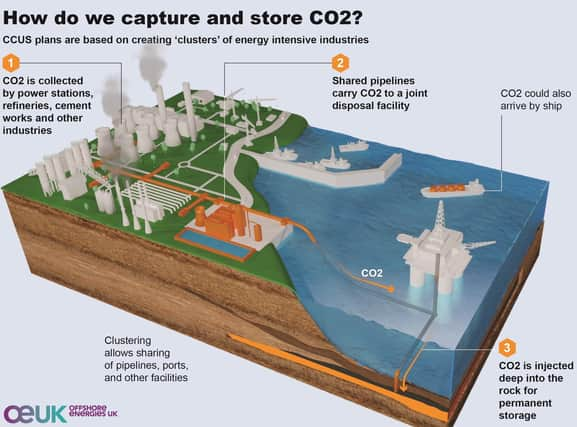Potential under-sea storage of greenhouse gas provides a massive opportunity
hg
Scotland‘s history is interwoven with the legacy of its past and present heavy industries. From iron and steel production to shipbuilding and coal mining, the industries pioneered by Scottish engineers have left an indelible mark on not just Britain but the world. Last week’s announcement of 20 new licences to store carbon dioxide under the UK’s surrounding seas, including off Scotland, means our nation could lead the world again – if we grab the opportunity.
The announcement, from the North Sea Transition Authority, opened 13 areas of seabed covering 12,000 square kilometres for carbon storage. Some lie offshore from Aberdeen and Peterhead with more off England’s northeast coast and in Liverpool Bay. They will be the first of many. The UK needs 100-plus CO2 storage sites to meet its target of cutting net greenhouse gas emissions to zero by 2050 – and many of them will lie off the Scottish coast.
By 2030, the UK wants to be storing 30 million tonnes a year. This would reduce UK greenhouse emissions by about ten per cent, with opportunity to store much more in future. This new technology is controversial. Critics say it will be too expensive to be viable. Some environmentalists oppose it for allowing continuing use of oil and gas. I’ll explain later why we reject those arguments.
David Whitehouse, chief executive of Offshore Energies UK (formerly Oil and Gas UK) at the port of Aberdeen.
Some of the prime sites for permanently burying CO2 will be the depleted reservoirs left by oil and gas extraction, reminding us how the taxes and energy from those North Sea fuels helped turn Scotland and the UK into one of the world’s largest economies. They also supported us through Covid and the shortages caused by the Ukraine conflict. Scotland remains reliant on such fuels – we get 79 per cent of our total energy from oil and gas.
But the emissions from using that oil and gas also cause climate change. My industry, the offshore sector, whose skills turned our North Sea, Atlantic and Celtic Sea waters into the

